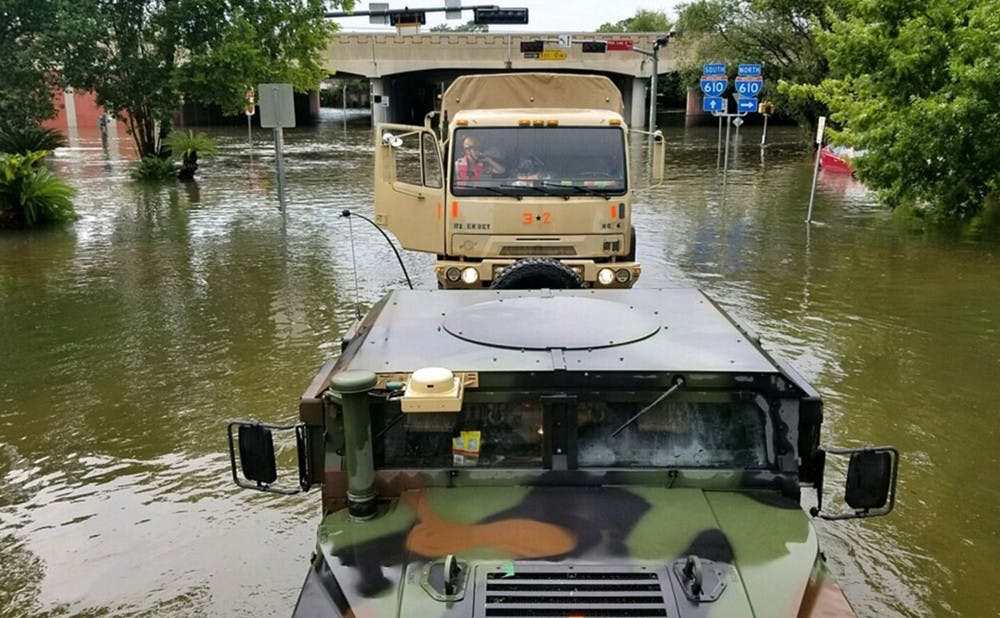As the dwindling remnants of Hurricane Harvey move north, professors at Duke discussed ways to mitigate the devastating toll of such large storms in the future.
The Associated Press reported Sunday that Harvey has taken at least 44 lives. Tens of thousands from the East Texas area are still living in shelters unsure about what the next years of recovery will be like. It's all the result of Harvey's remarkable 15 trillion gallons of rainfall.
“That's an enormous amount of rain,” said Mukesh Kumar, assistant professor of watershed hydrology in the division of environmental sciences and policy. “That excess precipitation causes runoff, which is generally much larger in cities because of impervious surfaces. But, the intensity of the precipitation was so big that even if it was not an impervious cover, it would still be flooded.”
David Schaad, professor of the practice of civil and environmental engineering, added that Harvey will have a lasting impact on the area for many years.
“The Texas Gulf Coast will be recovering from this disaster for years to come,” Schaad wrote in an email. “Old buildings will be razed and new ones will be erected. [The Federal Emergency Management Agency] is only a relief agency. The planning of what is next for this area will reside with the planning departments, city councils and citizens of the impacted areas.”
Schaad noted that the impact of flooding goes beyond just building structures. Other materials affected by water damage will have to be removed to avoid the risk of mold or rotting.
The professors also emphasized the importance of improving infrastructure both in terms of recovery and as a preventative measure for future disasters. Still, Kumar described the process of upgrading infrastructure as a classic economics problem. He said that cities could always plan for frequent high intensity storms, but that doing so would be very costly.
“What people try to do is to have balance between how often something will happen and how much will be the destruction,” Kumar said. “Based on that, we should design.”
Another preventative measure the professors discussed centers on maintaining and restoring wetlands, which consist of marshes or swamps. Brian Silliman, Rachel Carson associate professor of marine conservation biology, noted that wetlands act as a buffer to major storms.
But wetlands are disappearing. According to a 2014 Texas A&M University study, the greater Houston metropolitan area lost about 23,000 acres of natural freshwater wetlands between 1992 and 2010.
“Wetlands act as surface water storage areas,” Kumar said. “So, if those storage areas are not there, then other areas will get flooded.”
The study also noted that more than 70 percent of the wetland loss was due to development projects, specifically to accommodate the growing population within the Houston-Galveston region. Kumar said that more should be done to discourage developers from building on high risk areas like coasts, specifically the Texas coast.
There are also ways for cities to adapt to frequent flooding, Silliman added, but city and state officials must be willing to think long term. He said that in North Carolina, short term economic interests have too much influence on coastal policy.
“Those [short term] interests have resulted in the legislature not using models that predict more than ten years of flooding frequency on the shore line,” Silliman said. “Because we're not looking further into the future, we're not really preparing for it... So, we need to think longer term and maintain the safety of the people in these communities.”
In addition to government actors, everyday citizens can also support victims of Hurricane Harvey, Schaad said.
“Part of the issue with disasters like this is the sense of powerlessness which they engender,” he wrote. “People want to help, to partner—to contribute—and there are many ways to do that. The most pressing is donating to the relief effort.”
Vir Patel contributed reporting.
Get The Chronicle straight to your inbox
Signup for our weekly newsletter. Cancel at any time.
Class of 2019
Editor-in-chief 2017-18,
Local and national news department head 2016-17
Born in Hyderabad, India, Likhitha Butchireddygari moved to Baltimore at a young age. She is pursuing a Program II major entitled "Digital Democracy and Data" about the future of the American democracy.

